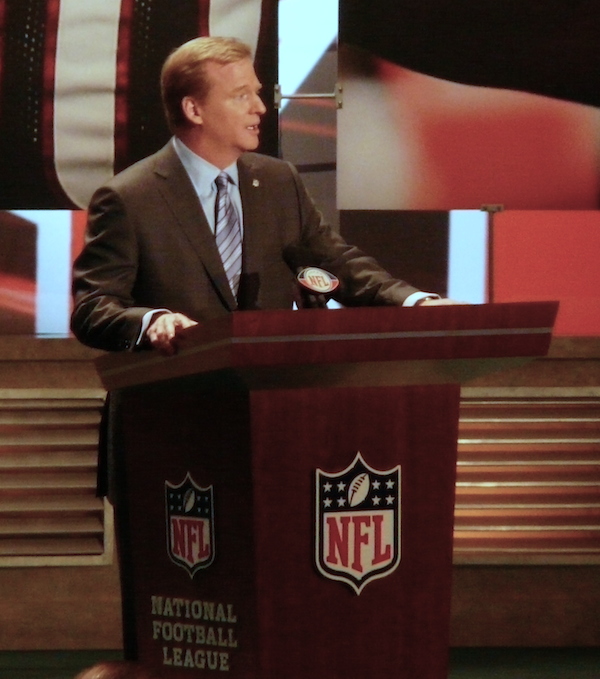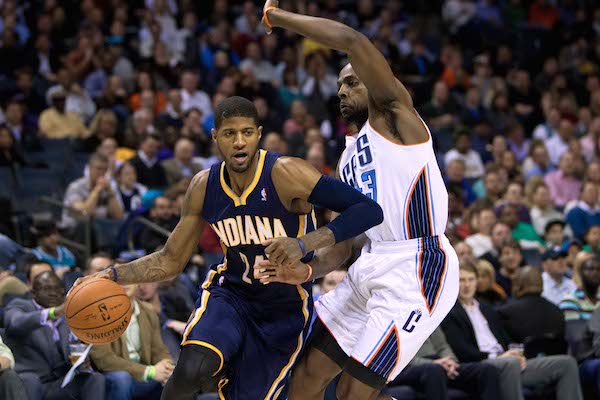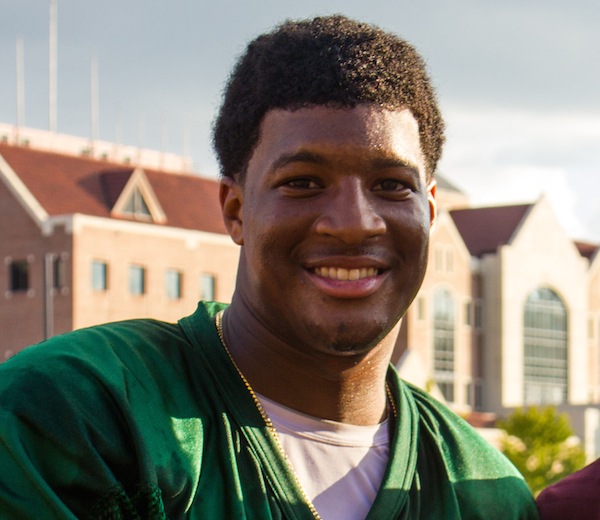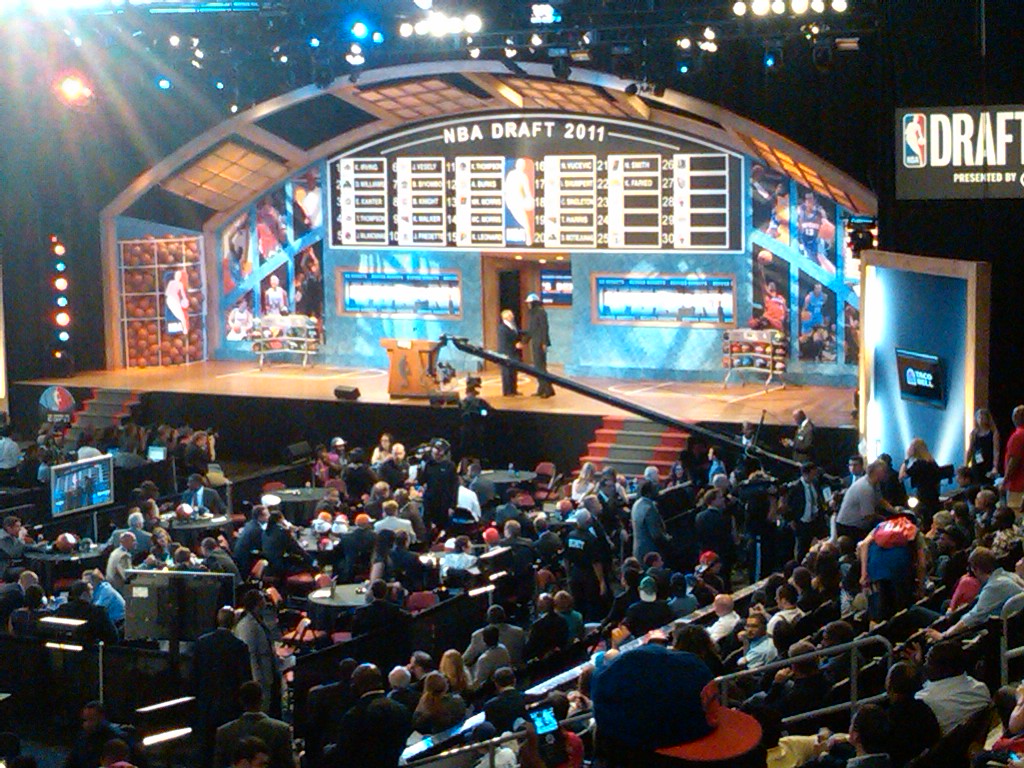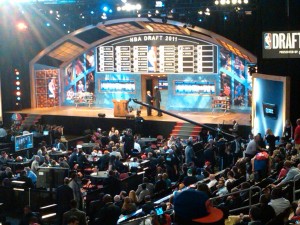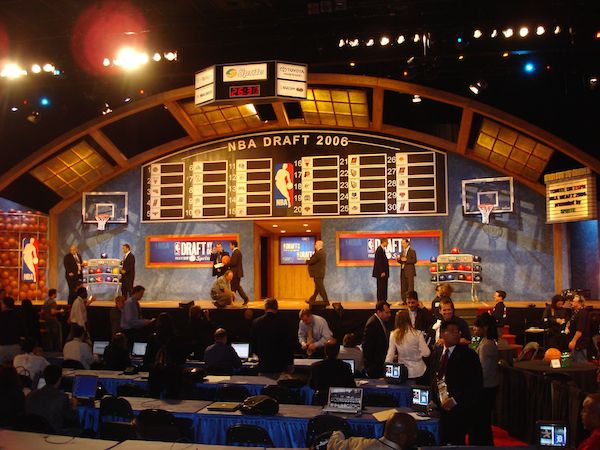It’s not hard to place what’s wrong with the National Football League draft happening on Thursday, April 30: the first player selected will almost definitely be a rapist. Not everything about the draft is so easy to figure out. It is hard to understand why the team with the first pick, the Tampa Bay Buccaneers, would make this choice. There are so many other decisions they could make that would be easily defensible from a football perspective and would not involve hiring someone who is almost definitely a rapist. It’s also hard to understand why journalists and media organizations of all shapes and sizes are either ignoring this fact or are merely motioning towards it with weak and insulting euphemisms like “off the field questions.”
The man who will almost definitely be made a millionaire when his name is the first called on Thursday night is Jameis Winston. Winston spent the last three years at the University of Florida State where he played quarterback for the school’s football team. He was part of the team in 2014 when it won a national championship and he became the youngest player ever to win college football’s most prestigious individual award, the Heisman Trophy, in the same year. He is also almost definitely a rapist. On December 7, 2012, a freshman student at Florida State told police that she had been raped. She would later identify the man who raped her as Jameis Winston and much later, when his DNA was tested and compared to some found on her clothing, there was a positive match. The comprehensive report on this crime and the subsequent investigation or lack thereof was written by Walt Bogdanich for the New York Times. Its conclusion is that “there was virtually no investigation at all, either by the police or the university.” That doesn’t mean that Winston did not rape this woman, just that the state prosecutor in charge of the case decided they didn’t think they could get a conviction. In fact, that prosecutor, Willie Meggs has publicly said, in response to being asked whether he thinks that Winston sexually assaulted the woman, “I think what happened was not good.”
We have a principle in this country that proclaims people are “innocent until proven guilty,” but that’s a legal principle, not a cultural one. “Innocent until proven guilty” makes sense as a legal rule because we generally believe that wrongfully imprisoning an innocent person is a worse miscarriage of justice than letting a guilty person go free. I believe in “innocent until proven guilty” as a foundational principle of law but I don’t think it means that we should blindfold and mute ourselves to a person’s actions simply because they were not convicted of a crime. From reading the New York Times expose, we know about the insufficient and probably willfully corrupt way the police and university officials handled the case. From reading Daniel Roberts wonderful piece in Deadspin, we know that the odds of being falsely accused of rape are “about the same as your odds of being attacked by a shark,” and that’s without factoring in that Winston was the most important football player in a corrupt and football crazed city. Winston is almost definitely a rapist.
Winston is almost definitely a rapist and I don’t think there’s actually much debate about the fact. So why won’t anyone say or write those words in the context of the NFL draft? The NFL draft is the signature offseason event for the most popular professional sporting league in the United States. It’s viewed by over 30 million people. Last year more than 9 million tweets (that’s up to 1.2 billion characters) were sent about the draft. Pre-draft media coverage is intense and focused largely on a form called the mock draft. In a mock draft, people predict what is going to happen during the draft — which teams are going to select which players. Virtually every mock draft this year predicts that Jameis Winston will be the first pick of the draft. Virtually none of them mention the fact that Winston is almost definitely a rapist. Some ignore it completely or some use euphemistic and infuriatingly demeaning language to refer obliquely to it. Below is a selection of mock drafts. (I chose somewhat randomly, but I did not exclude any for having mentioned the fact that Winston is almost definitely a rapist.) Many of these organizations have published excellent articles covering Jameis Winston as likely sexual assault perpetrator but in the context of the NFL draft, that work seems to have gone missing.
NFL.com mock draft by Charlie Davies: My top-ranked QB. Despite all the issues that surround him off the field, the Buccaneers feel good about their background checks and will make him their latest franchise QB.
CBS Sports mock draft by Rob Rang: Though questions still remain about Winston’s maturity, from purely a football perspective he is an excellent match in Tampa Bay…
ESPN mock draft by Todd McShay: No surprise here. I have Winston as the top-ranked player on my board, and I believe he will be the first overall pick by the Bucs on April 30. Tampa Bay has to get its quarterback of the future out of this selection, and while Winston does bring with him some off-field risks, I give him the edge as a player over Marcus Mariota. In the areas that matter most in projecting QBs to the next level — including reading defenses, going through progressions, anticipating throws and delivering the ball accurately — he’s one of the best prospects I’ve evaluated in the past 10 years.
Newsday mock draft by Nick Klopsis: …signs point to Winston more recently… As long as the Buccaneers have done their homework into Winston’s well-documented off-field issues, his name likely will be the first one called April 30 in Chicago.
New York Times mock draft from the Associated Press: Player character and behavior should be even more of a deciding issue in this year’s draft. The Bucs, desperate for a quarterback, say they are convinced the guy they choose is not a bad apple and is a great prospect.
Washington Post mock draft by Mark Maske: …Winston’s off-field issues must be considered when making such a franchise-defining decision. But Winston is the more NFL-ready QB and it would be a significant surprise at this point if the pick is not Winston.
The MMQB mock draft by Peter King …Always got the sense the Bucs wanted to pick Winston, then went through the investigative process to see if there was some great reason not to. They couldn’t find one…
[editors note] With no sense of irony, King starts his column with a long discussion of another prospective NFL draft pick, Shane Ray, and how his recent traffic violation and marijuana possession charge is likely to end with his being picked significantly later than he would otherwise have been. No mention of rape though.
The Big Lead mock draft by Jason McIntyre: Hasn’t changed. Wouldn’t be my guy.
“Issues,” “maturity,” “character and behavior,” “not a bad apple,” “background checks,” and “off-field risks.” That seems to be how NFL teams think about the potential problem of drafting someone who is almost definitely a rapist. To be clear, this is not just how football teams think about picking a player, this is how multi-million dollar businesses are thinking about the hiring process for one of their key employees. That’s reprehensible, especially if you combine that with the well documented fact that NFL teams are notoriously bad at predicting the success of quarterback hires. If you have a high profile hire to make and know that your organization and its 31 competitors have a long history of struggling to hire well in this position, why would you choose to hire the guy who is almost definitely a rapist?
There are so many other things the Tampa Bay Buccaneers could do with the first pick of the draft. They could take another quarterback like Marcus Mariota, from the University of Oregon, who also won a Heisman trophy during his college career. Or select a player who plays another position, like defensive tackle Leonard Williams who is said to be the most reliable player in the draft. Or trade the pick to another team and let them employ the rapist. In an highly competitive entertainment industry where success is based not just on winning but also on inspiring a base of people to literally wear your employees name on their backs, why would you hire someone who is almost definitely a rapist?
There’s very little we can do about this before Thursday. The Tampa Bay Buccaneers have already made up their minds about who to hire and Vegas is so certain that it’s Jameis Winston that they’ll only give you $100 if you bet $1,000 with them. That’s about as certain as something can be before it happens. Sexual assault is an enormous problem in this country and having our biggest sports league so blatantly ignore it deters people from taking the problem seriously. The best thing we can do is refuse to hide behind euphemism. If you want, you can follow Keith Olbermann’s call to boycott the NFL Draft. My preference is for you to go to a draft party or a bar where people are watching the draft or turn it on in your own house, and when Jameis Winston’s name is called, turn to the people next to you and say, “That guy is almost definitely a rapist. I wouldn’t hire him and I don’t think a football team should either.”

